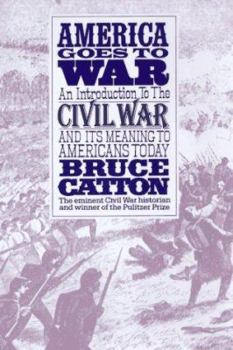America Goes to War: An Introduction to the Civil War and Its Meaning to Americans Today
Select Format
Select Condition 
Book Overview
A fascinating study of the first modern war and its effect on American Culture. This description may be from another edition of this product.
Format:Hardcover
Language:English
ISBN:1567310060
ISBN13:9781567310061
Release Date:January 1997
Publisher:MJF Books
Length:128 Pages
Weight:0.60 lbs.
Dimensions:0.7" x 5.7" x 8.6"
Related Subjects
Civil War Cultural History Military Modern (16th-21st Centuries) Politics & Social SciencesCustomer Reviews
3 ratings
Definitely worthwhile
Published by Thriftbooks.com User , 14 years ago
America Goes to War addresses some of the salient cultural issues that are absent from studies of military strategy, battles and politics of Civil War history, (though, all of these remain essential to a real understanding of the significance of Civil War). The value of Catton's lectures, for this reader, underscore the importance of the Civil War, as the modern warfare prototype that was to emerge in the 20th Century, and how the unresolved social and political conflicts, manifested by the Civil War, remain in the American cultural fabric, even today.
A Taste of Catton
Published by Thriftbooks.com User , 17 years ago
Bruce Catton's book is a collection of the lectures he delivered in 1958 at Wesleyan University. They discuss some of the ideas in his earlier books and suggest ways to explore incompletely answered questions such as how was the war approached, how was it fought, and how was the legacy of the North's victory and the South's defeat handled? His seven chapters discuss from a northern viewpoint salient aspects of the war beginning with his argument that the war was the first modern war due to its use of technology and tactics. Perhaps more importantly, he finds that the attitudes on both sides could be described as "total war" since complete victory was sought. Destruction of the ability to wage war became a goal as reflected by Sherman and Sheridan. Destruction of property evolved, according to Catton, into emancipation since that type of property was easily removed and useful in the North's war efforts. Catton reflects his northern biases in this chapter by, among other things, noting that some northern soldiers in the South realized that blacks were generally friends who could be counted on for help. He finds that emancipation effectively destroyed the South and changed the whole country since slavery was such an ingrained aspect of the fabric of the United States. Catton blames slavery as the primary cause of the war arguing that politicians finally could no longer find compromises. In the last chapter, "The Heritage of Victory," he presents the issue of racism and how emancipation with little effective follow up by the victors led to blacks becoming and remaining second-class citizens. Catton never tries to hide his northern perspective but he does discuss southern viewpoints and does not ignore northern failings. His narrative, nonacademic approach makes for entertaining reading but footnotes and a bibliography would help a reader wishing to do further research. Its 116 pages of text are well worth the short amount of time it takes to read this book and digest his ideas.
Eloquently Written Stuff
Published by Thriftbooks.com User , 23 years ago
The title: That's the only way I can put it. Not a novice to the Civil War, I picked this up simply because of who wrote it. Twenty years after his death, Mr. Catton is continually reasserting himself as THE author to read on the Civil War.This book contains general overtures, as written for lectures delivered at Wesleyan University in 1958, that he'd presented when he was alive. Like the title implies, passages are simply....beautifully written.The author takes you through a variety of topics, again generally: politics, the citizen solder, Lincoln, the terrible price of victory.... The layout of the literature is in lecture format, but does absolutely nothing to take away from what you're reading about.Spend the few dollars, and put this into your collection. It belongs on everybody's Civil War shelf. To take a line from page 68:We are a people to whom the past is forever speaking.






